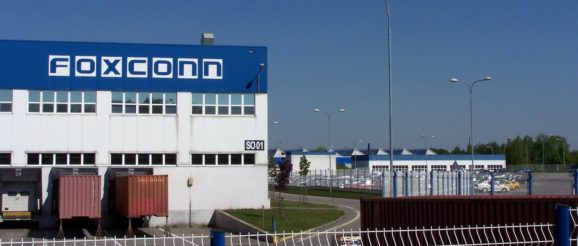Foxconn’s ‘Innovation Centers’ in Wisconsin Are Just Empty Buildings – ExtremeTech

Back in 2017, Foxconn signed a deal pledging to develop a $10B manufacturing facility in Wisconsin in exchange for extremely generous subsidies. Early this year, news broke that the deal had essentially fallen through, with Foxconn now intending to employ only a fraction of the 13,000 workers it had originally promised to hire. The major Gen 10.5 LCD manufacturing facility it had intended to develop would instead be replaced by a high-tech research hub. Then, one day later — after a phone call with President Trump — the company announced that it would build a small Gen 6 LCD manufacturing facility on-site after all.
There were good reasons to be skeptical of this plan. As we wrote at the time:
When foundries and IDMs like TSMC, Samsung, Intel, or GlobalFoundries make plant announcements, they build what they said they would. If those plans change mid-cycle, it’s treated as major news. Yet since signing off on the Wisconsin deal, Foxconn has made multiple dramatic alterations to its plans for the facility. First, it was a Gen 10.5 plant. Then it was a Gen 6 factory. Then it became a buzzword ecosystem to promote and research “AI 8K+5G” (that’s the actual term used), with most of the manufacturing done by robots. Yesterday, Foxconn told Reuters it would create a “technology hub” in Wisconsin, with research facilities, packaging, and assembly operations, with a focus on producing specialized tech for industrial, healthcare, and professional applications. That’s four distinct visions for the purpose of a facility that’s supposedly been under construction for over six months.
Would it surprise you to know the company isn’t following through on its previous commitments?
Last summer, Foxconn announced it was purchasing buildings across Wisconsin to turn them into “innovation centers.” In March, The Verge visited each of these buildings and found them essentially empty. The company hasn’t acquired all of the buildings it set out to purchase. Pieces of the buildings it has purchased are being rented to other, unrelated companies. After this unflattering coverage, Foxconn’s Alan Yeung promised the company would purchase and transform another building, this time in Madison. As The Verge writes:
One month after Yeung’s comments and promise of a correction, every innovation center in Wisconsin is still empty, according to public documents and sources involved with the innovation center process. Foxconn has yet to purchase the Madison building Yeung announced, according to Madison property records. No renovation or occupancy permits have been taken out for Foxconn’s Racine innovation center, though a permit has been taken out for work on the roof of another property Foxconn bought for “smart city” initiatives. There has been no activity in Foxconn’s Green Bay building, either.
Not pictured: Innovation. Photo by Joshua Lott/The Verge
No new permits have been taken out for the Eau Claire innovation center, and people who were supposed to work on it have yet to receive a contract or payment.
Work has slowly resumed on the factory site itself, but even here, problems abound. Foxconn reportedly has yet to provide documents demonstrating that the ground it intends to build on can support the weight of the proposed facility. That report is required before the company can break ground on the factory itself, and the facility is still only expected to employ ~1,500 people, not the 10,000+ Foxconn initially promised. Foxconn claims it will still eventually employ ~13,000 or more in WI, but has offered no credible data on how this will be achieved.
We extensively cataloged Foxconn’s history of broken development promises the last time we evaluated the company, so we won’t rehash the history here. The bottom line is this: More than two years after signing a deal to supposedly build a factory to manufacture large LCDs in exchange for enormous state subsidies, Foxconn has not delivered on its end of the deal. The company’s history does not suggest it will — at least not in the manner contemplated by the Wisconsin legislators who agreed to the contract in the first place.
